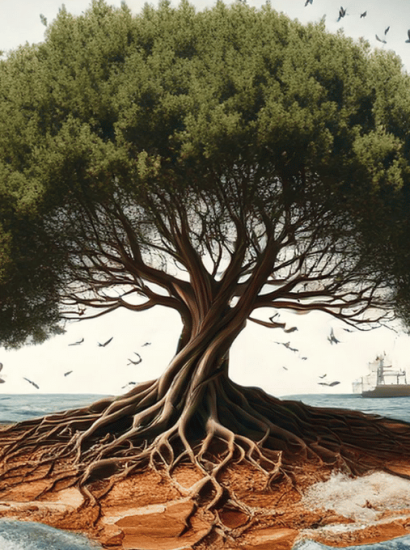This post is also available in: ΕΛΛΗΝΙΚΑ (GREEK) TÜRKÇE (TURKISH)
The new President of Cyprus may be received in a well-intentioned manner, but no one can overlook the fact that Nikos Christodoulides has a 9-year history alongside former President Anastasiades, who is considered the most unreliable President of Cyprus on the Cyprus problem.
The climate in Turkey-EU relations is changing. The hitherto poor relationship between Greece and Turkey also seems to be changing. Where does Cyprus stand? Last week, two Cypriot politicians sent Ankara strong messages of solidarity with the Turkish people, and also communicated their willingness to reach a political understanding with the country’s leadership.
Last Monday, at the Donors’ Conference, which aimed to repair the damage caused by the devastating earthquakes that struck Turkey on February 6, there was a state of euphoria. The EU took the initiative, Sweden chaired the meeting and all EU Member States, as well as other countries, took part. Announcements and promises were made for donations to the tune of 7 billion. Stockholm’s assumption of responsibility for raising this amount may not be at all unrelated to Turkey’s veto against Sweden’s NATO accession.
Among the donors were Greece and Cyprus, while particular interest was given to the fact that the contributions were announced by two Cypriots. On behalf of Greece, Civil Protection Minister Christos Stylianides announced a €5 million donation and on behalf of Cyprus, Foreign Minister Constantinos Kombos announced a €500,000 donation. On the sidelines of the conference, Mr. Stylianides held a long conversation with Turkish Foreign Minister Mevlut Cavusoglu, while the Cypriot Foreign Minister also discussed with the Turkish Foreign Minister for a few minutes.
Politics
In both cases, the message to Cavusoglu was clear: “We are ready for talks.” The same message was delivered by President Christodoulides during his recent visit to Brussels. In this context, could concrete results be achieved? How communicative or substantive have the moves of Nikos Christodoulides been in recent weeks?
Although the Cypriot President insists on stating that there is no time to waste before the Turkish elections in May, everyone acknowledges that no initiative can be undertaken before the completion of elections in Turkey. With whom and what will he discuss when the country is currently in the grips of the fiercest electoral confrontation it has seen since its inception? Also important is that Athens likewise settles the issue of elections, although everyone recognises that Greece (be it with ND [New Democracy] and [Kyriakos] Mitsotakis or with Syriza and [Alexis] Tsipras) does not have different approaches to the Cyprus problem. Is the same true for Turkey?
There are many who argue that relations between Turkey and Greece are changing after the devastating earthquakes. The Turkish government has decided to pull back and this was facilitated by Greece’s attack of friendship and solidarity, which was highly appreciated by Turkish public opinion. First and foremost, Turkey is in dire need of the EU’s billions and understands that this aid will not come as long as it maintains an ambivalent attitude towards Russia’s invasion of Ukraine and as long as it continues to threaten EU member states such as Greece and Cyprus. Will Kilicdaroglu do the same if elected?
Tayyip Erdogan has proven that he escalates and de-escalates tension with Greece depending on the political circumstances. Prior to the deadly earthquakes of February 6, the Turkish President had ramped up his provocations towards Greece, wanting to rally Turkish citizens by making use of their nationalist sentiments. Threats against Greece of the “we will come at night” type were constant, causing further fanaticism within Turkish public opinion. Following the earthquakes and the accident at Tempe [train crash in Greece], Erdogan has changed his tune and no longer challenges Athens.
On the other hand, Kilicdaroglu has shown signs of a different kind. In July 2022, the opposition Presidential candidate accused Erdogan of meekness for not claiming 36 islands from Greece and called on him to invade, aligning himself with the narrative that seeks the militarisation of islands. He even accused Erdogan of being all talk, unlike Bulent Ecevit, who had invaded Cyprus. Earlier, in another rant, Kilicdaroglu had accused Erdogan of being too flexible towards Greece, calling him a bully and claiming that he does nothing about the islands “under occupation”.
The situation for Kilicdaroglu today is, of course, also different. The February 6 earthquakes constituted the worst natural disaster to strike modern Turkey, with more than 56,000 fatalities in both Turkey and neighbouring Syria. Russia does not appear to be winning any war in Ukraine, with its economy at risk of being driven to disaster in the coming years, that is unless it becomes a financial satellite of China. Finally, it should be stressed that the Kemalist Kilicdaroglu is clearly pro-Western and pro-NATO, and will attempt to improve relations with both the EU and the US.
Does it have credibility?
In any case, the test of Turkey’s credibility will take place after the elections, probably early next autumn. Well-placed diplomatic sources point out that there are preconditions both in terms of time and substance and, above all, some serious clarifications are needed from Christodoulides as well.
The new President of Cyprus may be received in a well-intentioned manner, but no one can overlook the fact that Nikos Christodoulides has a 9-year history alongside former President Anastasiades, who is considered the most unreliable President of Cyprus on the Cyprus problem. Part of this unreliability is inevitably shifted onto him, since he was his closest associate as government spokesman and Foreign minister.
Nicos Anastasiades, under the weight of criticism that ensued after the abandonment of talks in Crans-Montana, in his attempt to justify himself, said a lot and even resorted to vulgar populism, claiming that he did not sign the agreement because Cyprus was in danger of turning into Lebanon. He even went so far as to resort to cheap accusations against Antonio Guterres, deeming him irresponsible and partly to blame for the failure of talks in Crans-Montana. Two months before the end of his term of office, he began stating what Nikos Christodoulides is claiming today.
In Crans-Montana, Mr. Christodoulides was standing next to Mr. Anastasiades, applauding him. He returned to Cyprus and defended him. Today, he is giving interviews where he tries to appear as something different. He is even emphatically noting that “Cyprus talks should not start from scratch, but should resume from where they left off in Crans-Montana”, despite the fact that after 2017 he tolerated Anastasiades going around talking about a two-state solution and stressing to a head of a television channel (in the presence of Mr. Christodoulides) “that the Bi-zonal Bicommunal Federation is dead”.
In short, “Mr. Christodoulides will have to be much clearer if he is to be trusted”, according to a European diplomat. Throughout his election campaign, unlike Mr. Mavroyiannis and Mr. Averof, he referred to the Guterres framework, stressing that it should be the basis for negotiation, but he did not refer to the agreement that had brought us one kilometre from a solution (i.e. a final give-and-take), as Antonio Guterres recorded in his report.
This statement of his, that the Guterres framework is a “basis for negotiation”, is more reminiscent of Tassos Papadopoulos’ position when he said he accepted the Annan Plan, convincing Demetris Christofias to exclaim “the man has changed”.
Today in Brussels, no one wants to play the role of Günter Verheugen again, not even that of [Federica] Mogherini, who feel that they have been tricked and humiliated by the G/C side, certainly without wiping away the intransigent stance of Turkey which has literally irritated everyone with its constant vague positions and especially with its promises.
Clearly, Christodoulides’ policy is aimed at breaking the current deadlock on the Cyprus problem, but he is still not convincing anyone that he himself as well as the parties that support him are ready to back him to walk the last mile on the Cyprus problem. He wants to bring Turkey to the table, once it withdraws its two-state rhetoric, but this – if achieved – also requires some corresponding moves on his part which have not been made. It means, first and foremost, accepting a speedy process for resolving the problem. This process does not require lengthy negotiations, as he seems to favour by describing the Guterres framework as a “basis for negotiation”. Everyone regards the Guterres framework as being very close to the final deal: We will get an end to guarantees and an improved map on territory; they will get political equality and favourable property arrangements for T/Cs in the T/C-administered areas. It will also instigate the implementation of the acquis communautaire throughout Cyprus.
The specifications
In this case, why do we need non-papers and an upgraded EU envoy on Cyprus? The basic idea, according to Mr. Christodoulides, is that we need a political persona (e.g. [Jean-Claude] Juncker or the Dutch Prime Minister Mark Rutte), who will be much more well-known and prestigious than Pieter Van Nuffel, who, during the period 2015-2017, had, alongside his team, framed the UN-led Cyprus Problem negotiating table. It is worth recalling that Mr. Van Nuffel and his team checked at every stage whether the solution agreement under discussion was compatible with EU laws and the acquis. The Van Nuffel team rejected extreme demands that the Turkish side put on the table either out of ignorance or out of maximalism, but this never satisfied President Anastasiades, nor apparently Mr. Christodoulides.
We understand that the Greek side is today asking for something more, which everyone needs to consider whether it is realistic. “Mr. Christodoulides’ basic idea, which everyone is trying to understand, is that a more active role for the EU and the appointment of an EU envoy (who will be tasked with holding talks with the Turkish leadership) should lead to a resumption of talks, with the Republic of Cyprus subsequently reinforcing the positive atmosphere by helping to promote issues of direct interest to Ankara, leading to the renewal of the EU-Turkey customs association, the liberalisation of EU entry visas to Turkish citizens and its participation in the PESCO defence cooperation programme”, wrote our Brussels envoy Ioannis Seitanides following Christodoulides’ statements.
Without stating exactly what it is that he wants in the Cyprus problem and referring to a non-paper which he ultimately did not share with anyone, the Cypriot President further stated before the EPP [European People’s Party] in Brussels that “the EU will have to give Turkey something in return in order to avoid leaving it in the hands of Russia”.
What worries some people is whether with these positions Christodoulides believes that the EU will negotiate and give solutions to the big issues between the EU and Turkey, in relation even with Russia, so that Cyprus can get what it wants in the Cyprus problem. Also a source of concern is that Turkish Cypriots are nowhere to be found in his discussions. Everything is left to the European negotiator who will be accountable for his every action to the European Council and by extension to [Christodoulides] himself. Basically, Nikos Christodoulides is talking about exploiting the interests involved in an EU-Turkey give-and-take. We have the impression that even Vassos Lyssarides would not dare to raise such issues, if it was not absolutely clear what other EU members (AND not only Cyprus) would gain, e.g. from the liberalisation of EU entry visas to Turkish citizens. Apparently, Mr. Christodoulides believes that the EU will agree to the free movement of 80 million Turks into its territory so that Ankara opens two ports on its own territory to Cypriot-flagged ships.
Donations to Turkey
What is certain is that Turkey, after the devastating earthquakes, seems more ready to talk to the West and especially to the EU. In the coming months, Cyprus could engage in this dialogue, under certain conditions: If it knows exactly what it wants in relation to the Cyprus problem. If it asks for realistic things. If the EU itself considers it credible to engage. If Turkey is willing to change course in the Cyprus Problem. Before all this is even discussed, the EU has already began to support Turkey through the big Donors’ Conference it organised. “Total pledges today amount to 7 billion euros,” said Swedish Prime Minister Ulf Kristersson. He said the money “will help people whose lives were destroyed in a matter of seconds and minutes” and gives hope “that the rebuilding of dignity and of everyday life will be possible.”
In short, Turkey is no different from Credit Suisse. It’s too big to fail, so it will be supported anyway. Europe has already started: Preliminary numbers include one billion euros from the EU’s Executive, the European Commission, half of which will be spent through the bloc’s lending arm, the European Investment Bank (EIB), suspending the bank’s near-total ban on financing Turkey in recent years.
Germany will also double its aid for those affected in Turkey and Syria to €240 million, Foreign Minister Annalena Baerbock said.
The Commission will spend an additional €108 million on humanitarian aid and early rehabilitation in Syria, where the EU has no diplomatic relations with President Bashar al-Assad because of the war that started there in 2011.
The UN Development Programme (UNDP) estimated that the “total economic burden of the earthquake disaster” for Turkey stands at around $103.6 billion and said this represents 9% of the country’s projected GDP for 2023.
It estimated that some 3.3 million people have been forced to leave their homes and most are now living in temporary accommodation. It added that about 650,000 homes would have to be rebuilt.
Housing reconstruction
President Recep Tayyip Erdogan, addressing the Brussels conference via videoconference, estimated the cost of the earthquake at $104 billion, noting that Turkey would build 319,000 houses in the first year.
“It is not possible for a single nation to face a crisis of this scale alone,” he said. “We will never forget the solidarity shown by all our friends… in these difficult days.”
Source: DONORS’ CONFERENCE FOR TURKEY AND THE PROSPECTS FOR A CYPRIOT SOLUTION







[…] ENGLISH (İNGİLİZCE) ΕΛΛΗΝΙΚΑ (YUNANCA) […]
[…] ENGLISH (İNGİLİZCE) ΕΛΛΗΝΙΚΑ (YUNANCA) […]